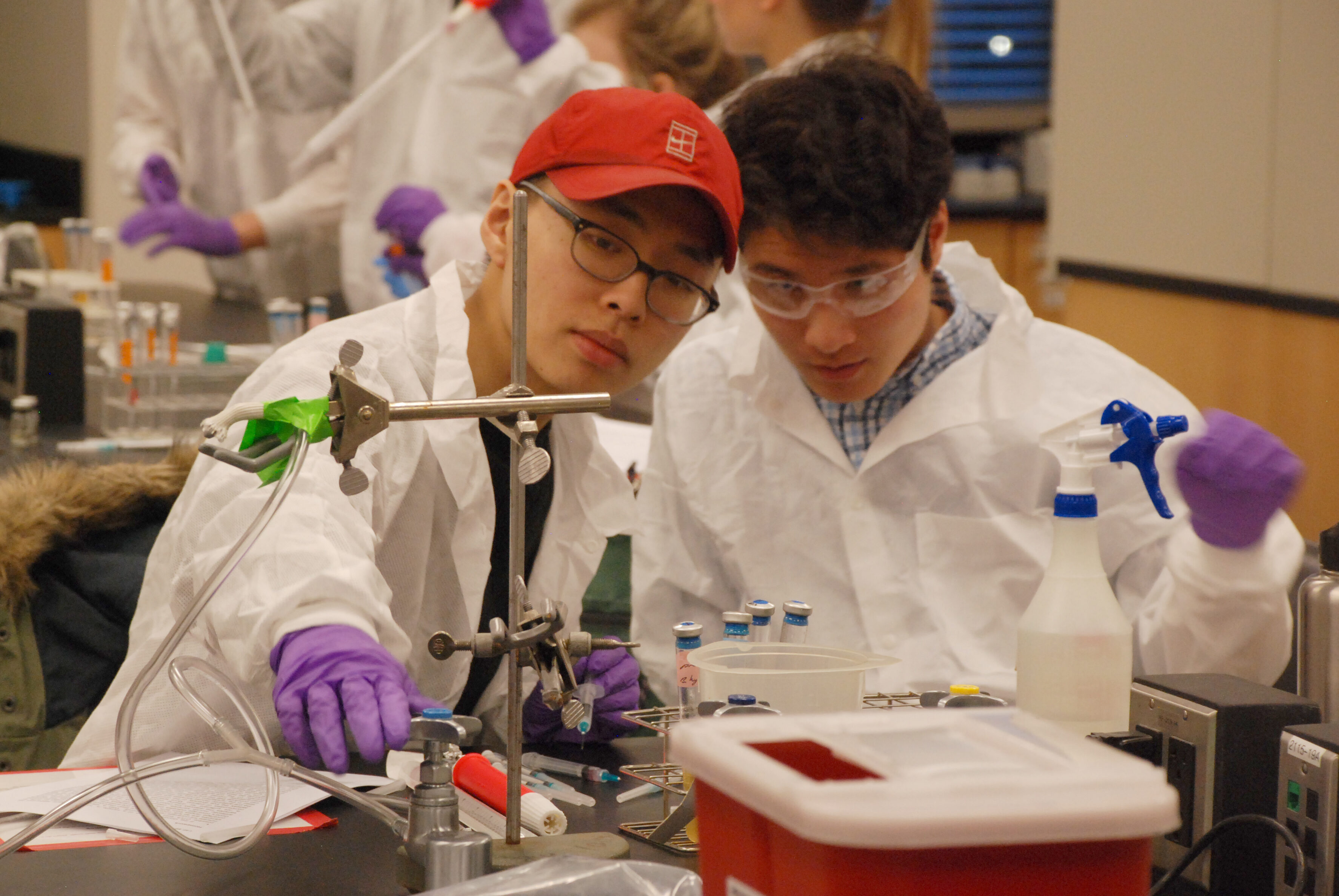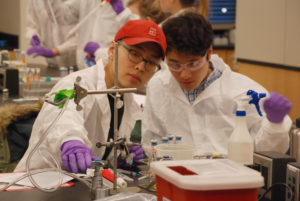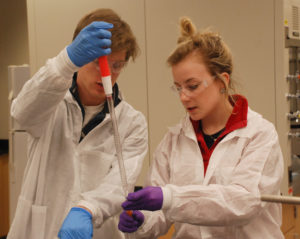
Undergraduate biology students Christopher Hu, left, and John Fan are part of a laboratory class in which students analyze the microbes that live in their own digestive systems. Teams of students use class data to test a hypothesis about the gut microbiome. For example, do the students’ microbial communities differ based on what dorm they live in? Photo by Dale Austin.
A “me-search” lab for University of Michigan biology undergraduates gives students a close look at what might be the most compelling study subject of all: themselves.
The lab focuses on the human gut microbiome—bacteria and other tiny organisms that live inside the human digestive system.

Undergraduate biology students Christopher Hu, left, and John Fan are part of a laboratory class in which students analyze the microbes that live in their own digestive systems. Teams of students use class data to test a hypothesis about the gut microbiome. For example, do the students’ microbial communities differ based on what dorm they live in? Photo by Dale Austin.
Naturally, the course syllabus includes stool samples. By dry weight, excrement is 40 percent microbes. Some of them harm us, but the vast majority of microbes live in our digestive system and help us process food, overcome allergies and generally maintain our health.
Using a protocol involving waxed paper, a Popsicle stick and several flushes, students in the new introductory biology lab are researching the contents of their very own gut microbiome.
The students extract DNA from their fecal samples and sequence the species of their gut microbial community. They also link the DNA information to data about themselves: height, weight, gender, daily diet and other relevant stats.
They use those data to test hypotheses about how their gut microbiome affects their health: Does the microbial community differ between lean students and students with higher body mass indexes? Students who were breastfed and those raised on baby formula? Students delivered by cesarean sections and those by natural births?
The syllabus steers away from more traditional “cookbook” lab courses, in which correct, expected outcomes are easy to grade.
“We want students to see the whole process of discovery, from when we don’t know the answer to when we get the answer. That’s the real excitement of science,” said Deborah Goldberg, a professor in the Department of Ecology and Evolutionary Biology who helped establish new Authentic Research Connection lab courses in the College of Literature, Science, and the Arts.
And this alternative hands-on approach will hopefully produce insights about the gut microbiome that can have an impact beyond the classroom. Ideally, the “me-search” of labs like this one will turn outward to improve public health for people around the world.

Undergraduate biology students Samuel McMullen, left, and Hannah Engle. Students in the lab course extracted DNA from their stool samples and sequenced their community of gut microbes. Photo by Dale Austin.
Grants from the Howard Hughes Medical Institute, National Institutes of Health, Burroughs Wellcome Fund, U-M’s Fast Forward Medical Innovation grant and Procter & Gamble have supported the development of this unique hands-on introductory lab (Biology 173), along with others like it.
Students interested in chemistry can take similar research-based lab courses (Chemistry 125/126) that involve building solar cells to figure out how to improve renewable technology, or scooping snow from the highway to see how road salting can change environmental chemistry. Over the next five years, 3,700 undergraduates will participate in these courses.
With a focus on authentic research and discovery, these courses aim to retain students in STEM majors and engage citizen scientists. The data collected by and about the students also will inform the research of the broader scientific community—the gut microbiome lab course serves as a pilot study of healthy human subjects.
And faculty across campus, collectively known as the Michigan Microbiome Project, are linking microbes to public health concerns such obesity, mental illness, and harmful algal blooms in the Great Lakes. Project faculty members include Tom Schmidt, a professor in the Department of Ecology and Evolutionary Biology and the Medical School’s Department of Internal Medicine.
Schmidt directs the Center for Microbial Systems and helped spearhead the gut microbiome lab. He said he hopes the work will ultimately allow researchers to manipulate microbial communities so they can improve human health and otherwise understand the world.
To that end, Arvind Venkataraman, a postdoctoral fellow in the Department of Internal Medicine and co-instructor of the lab, plans to tackle a project in India that addresses malnutrition among children.
“What I’m most excited about is to be able to take a person’s fecal sample and characterize their microbiome,” he said. That way, he can try to understand the difference between the microbial community of someone who’s healthy and someone who’s ill, and even help steer an ailing gut microbiome toward a healthier balance.
Really, this work is just beginning. Microbes are difficult to identify as species, let alone understand as communities, and researchers know little about their specific functions.
“I feel like we’re actually at the start of something big,” said Andrew Stevens, an undergrad who’s planning on a career in psychiatry or alternative medicine. “When we first discovered DNA, people didn’t realize that it would be useful for anything like identifying things at crime scenes.
“As we research the microbiome more, we’re going to realize its effects and that we can manipulate it. We’re going to be able to actually affect the microbiome, and affect our body as a result.”
For now, the students in the gut microbiome lab are committed to figuring out which tiny creatures live in their bodies and what those creatures are doing. Regardless of what the students choose as a major and career, the hope is that early exposure to real research will add to their success in applying the scientific method to all aspects of their lives.


